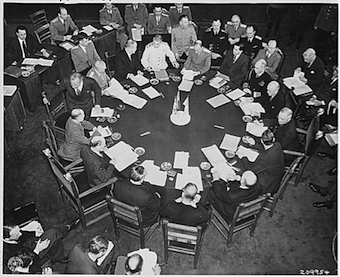

|
The Hardening of Positions  Potsdam Conference Victory in May hardened Stalin's expansionist line. According to Khrushchev, Stalin 'believed that he was in the same position as Alexander I after the defeat of Napoleon and that he could dictate the rules for all Europe. By July he was counting on a share of influence to include the Baltic states, Poland, Czechoslovakia, Hungary, Romania and Bulgaria. Churchill was afraid of Communism spreading into western Europe, if the US withdrew troops for the war in the Pacific. This was the context of the Potsdam Conference where President Truman advised Stalin that the Americans would use the atom bomb to force the Japanese to surrender. The bomb altered everything. Stalin so far had been relatively cautious in his strategy for the Sovietization of the Soviet zone. Fearful of alienating the Allies, he had instructed the Communist parties to join the anti-fascist coalition governments (national fronts) established in 1945 rather than to rush ahead with revolutionary plans. He refused to support the Communists in Greece, in the Western sphere of influence, and told their comrades in eastern Germany not to go beyond the 'minimum programme' of land reforms and nationalizations (hoping thereby to broaden their appeal to the rest of Germany). In the Soviet view the countries of Eastern Europe were ready for 'bourgeois democratic' revolutions like February 1917 but not for 'Octobers' of their own. The Communists were small minorities, and nationalism was too strong, so each society would have to advance at its own pace on 'separate paths to Communism'. Stalin's patience was broken by the dropping of the bomb. He saw Hiroshima as a hostile warning against the Soviet Union. It reinforced in Stalin's mind the need to be tougher in his dealings with the West: to use his troops in Europe as a counter-threat to the US bomb. In his first major speech of the post-war era, in the Bolshoi Theatre on 9 February 1946, Stalin called on the Soviet people to prepare for the next global conflict, which was bound to come about 'as long as capitalism exists'. The speech was taken in the West to mean that the Soviets were willing to engage in war. It was soon followed by a toughening of the US position towards the Soviet Union. |
© 2014 Orlando Figes | All Rights Reserved